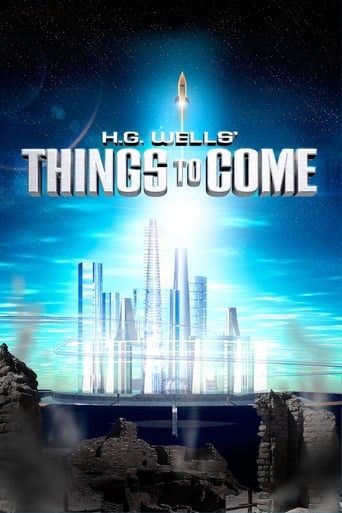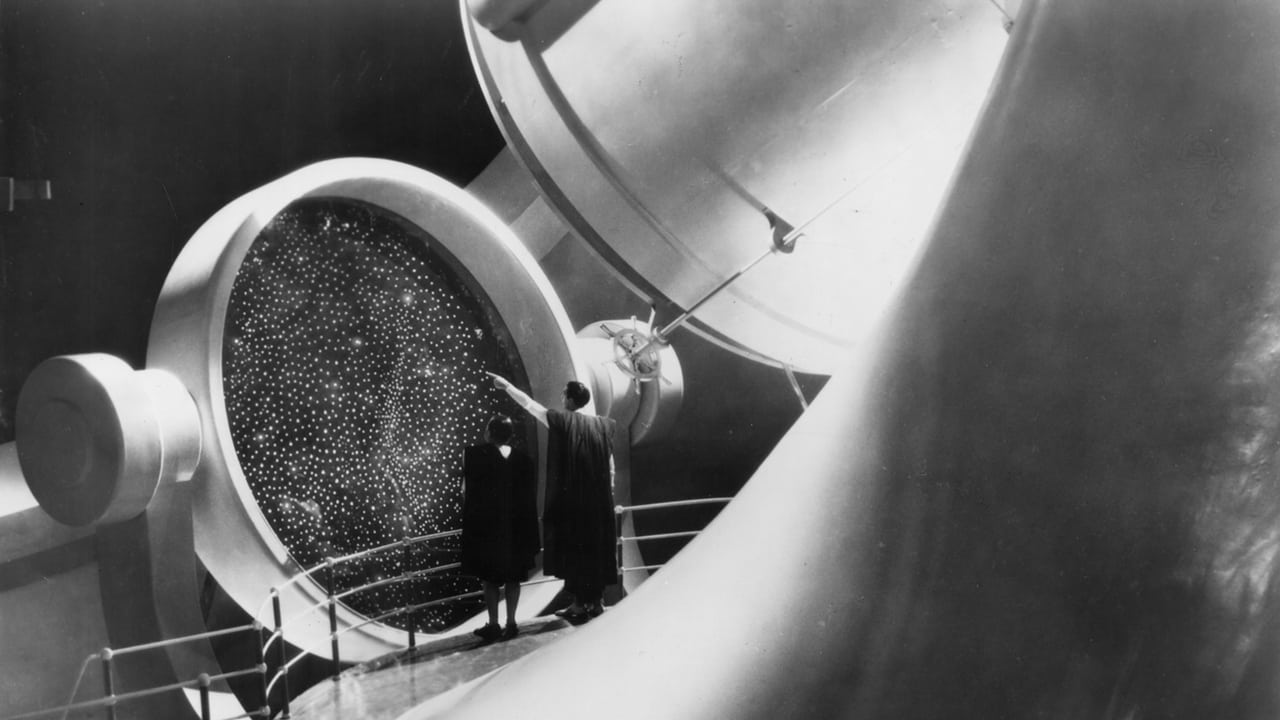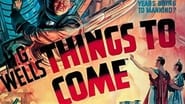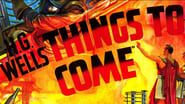disinterested_spectator
When this movie opens, the setting is Everytown in 1940, and everyone seems to be caught up in the spirit of Christmas, even though there are signs (literally, signs) of an impending war to which people seem oblivious. Then we see John Cabal reading the newspaper, where the headline refers to the "air minister," whom the cabinet has given a free hand. Being produced in 1936, this movie was made at a time when a lot of people thought that airplanes would be the dominant factor in future wars. Cabal even has a large painting of an airplane hanging on the wall.Cabal's friend, "Pippa" Passworthy, is a naïve optimist that believes there won't be any war, but Cabal, whom someone refers to as an incurable pessimist, believes that war will come. Cabal does not like war, mostly because it interferes with progress, but Passworthy, always looking on the bright side, says that there is greatness in war, and it stimulates progress.Then comes a sneak attack by an unmentioned enemy, starting a war in which gas bombs are a major component. The war lasts until 1966, after which civilization has been reduced to rubble. In postwar Everytown, a frustrated mechanic complains that he is unable to repair the airplanes and that nothing will ever fly again, so once again we see how airplanes are symbolic of civilization and progress in this film.A plague called the wandering sickness spreads throughout the land, and there is nothing doctors can do, because there is no medicine left. A man takes charge, ruthlessly killing those infected and staggering around, until the plague is finally wiped out in 1970. He becomes the leader of Everytown, and is called "Chief" or "Boss." He wears a coat made of furs, looking like a barbarian warlord, and he is intent on waging war against the "hill people."Suddenly, John Cabal lands in a futuristic airplane in a futuristic flying outfit. He tells Dr. Harding, whom he knew before the war, that a bunch of engineers and mechanics have banded together to form the "brotherhood of efficiency, the freemasonry of science." When Dr. Harding enthusiastically embraces the idea, saying, "I'm yours to command," Cabal replies that neither he nor anyone else is in command, that there will be no more bosses. Rather, "Civilization is to command."When Cabal goes to talk to the Boss, the Boss says that his country is at war, to which Cabal replies, "We must clean that up." He tells the Boss that his organization is called "Wings over the World" (again the obsession with aircraft as the ultimate form of technology) and also "World Communications." In the course of their discussion, Cabal says, "our new order has an objection to private aeroplanes." And when the Boss says that his territory is an "independent sovereign state," Cabal says, "We don't approve of independent sovereign states."The gist of all this is a conservative's nightmare, and even liberals will find a little unease in all this talk about a world government that does not permit sovereign states, or individuals to have the freedom to own an airplane (because airplanes represent power, this is the equivalent of denying individuals the right to bear arms). And saying that this world government has no leaders makes us suspicious, reminding us of Marx's communist ideal in which the state withers away. Denying that anyone has power, asserting that one is merely executing the impersonal will of the organization for the good of mankind, sounds like a way of disguising its totalitarian nature.The Boss is portrayed as a brutish anti-intellectual, who thinks it is just as well they don't print books anymore, because they muddle thoughts and ideas. He doesn't trust scientists, but he needs them for his war effort, to make fuel and poison gas. He tries to get Dr. Harding to help with his war effort, but Harding refuses, because in this movie, scientists are good and politicians are evil.Eventually, the air force of Wings over the World drops the gas of peace on Everytown, which merely puts everyone to sleep, except the Boss, who conveniently dies. Then what follows is a montage of futuristic industry, in which everyone is hard at work. In fact, everyone seems to do nothing but work. We don't see people playing games, singing and dancing, or going to the movies. We begin to wonder, What is it all for, if all everyone is going to do is work?Finally, it is the year 2036, and everyone lives underground. This new civilization has not merely conquered nature—it has turned its back on it. An old man tells a little girl about the old days, when people had to live half out of doors, with windows to let the sun in, not realizing they could do without all that.Eventually, someone called Theotocopulos begins to protest this way of life, arguing that life was more merry and vigorous in the old days. Now, if he just wanted people to be able to have more fun and not work so hard, that would have seemed reasonable. But this movie naturally has to make him into a Luddite who opposes all progress. He addresses the people, who seem to agree with him, but since this futuristic civilization does not appear to be a democracy, what the people want is irrelevant, and they are thwarted.Oswald Cabal is the great-grandson of John Cabal. Even though supposedly there are no bosses in this new civilization, Cabal seems to have a lot of hereditary power as president of the council. When Passworthy (another descendant) says, "Oh God! Is there never to be any age of happiness? Is there never to be any rest?" Cabal dismisses rest as death. "It's the all the universe or nothingness," he declares. How about just half the universe and a little free time to enjoy life?
Python Hyena
Things to Come (1936): Dir: William Cameron Menzies / Cast: Raymond Massey, Edward Chapman, Cedric Hardwicke, Ralph Richardson, Margaretta Scott: Early science fiction film with a title that refers to our unpredictable future and dire uncertainty but the film's structure is completely predictable. A strange being lands on earth with a message. He doesn't tell us to give up smoking or use a particular brand of deodorant. No, he tells us everything that we do not want to hear because there isn't a soul in the film who listens to him anyway. He shows up wearing a helmet big enough for ten heads. Not exactly original and mainly serves as a showcase for special effects that render the film worthwhile. Well directed by William Cameron Menzies but painfully corny at times. It taps into one's imagination when it comes to our expectations to the unknown. Raymond Massey does well as this ominous figure whom transcends much turmoil and observes mankind's faults. The only interesting supporting role is Ralph Richardson as a warlord advocating destruction and the manufacturing of biplanes. As the ending indicates, this sort of ruling often goes down with the planes. Many of the performances are either flat or over the top. Among them are Edward Chapman and Cedric Hardwicke. The film was an attempt to push special effects further to greater things to come. Score: 6 / 10
utgard14
A world war that begins in 1940 rages on for decades before a group of scientists known as Wings Over the World emerges to put an end to all war and bring about Utopia. Sci-fi classic with amazing visuals and, despite its pomposity, a good script with many memorable lines. Yes, it's preachy as H.G. Wells was very much an ideologue at the time. I'm sure if I lived during the time I would have rolled my eyes at Wells just as I do today's celebrities who think they have all the answers but really have very few. The preachiness and moral simplicity of the story, and indeed all of Wells' later works, seems quaint today and is unlikely to offend anyone but the most sensitive political types.The acting is solid, though sometimes stuffy as was often the case in British films of the period. I don't say that as an insult, just as a point of fact for those expecting something more Hollywoodish. Raymond Massey has to utter most of the film's philosophical soliloquies. Ralph Richardson and Cedric Hardwicke get the juiciest roles as the villains. All three of these men are fine actors who give excellent performances. This is also director William Cameron Menzies' best work.It's an exceptional movie despite its flaws and maybe even because of them. It has merit as entertainment, a think piece, and a historical curio. There are very few movies made during this period that could match the look of this one. Fritz Lang's Metropolis, obviously, but I'm not sure of any others. The sets, costumes, matte paintings, models, are all extraordinary. Everyone who loves science fiction or just loves old films in general should definitely see this one.
tl12
wonderful and historic film when most of you would not know important film if it bit you in the As*. I am always cheered by the cries of "this film from the 30's does not good as films now and where are all the car crashes and explosions?"I think the saddest part is that many reviewer are so terribly ignorant about film history that they don't even know that they are ignorant. Of course it does not look like a 2000+ film. When it was made it was state of the art. That is the sole way it can be judged, by the standards of it's time. The entire concept of history of all kinds and what we can learn and lessons it holds have been pitched by the masses of the ignorant that now write 90% of the reviews here. They gather all their 14 year old friends around and write such drek it makes me cry. I really have been a 3rd or 4th grade teacher so I could flunk you all till you were about eighteen and liberated from school. Because the level of the average high school student now is equal to a 3rd or 4th grader or 15 or more years ago. You make me despair. If you don't like the film for legitimate reasons, fine. It's just that now 90% of the reviewers can't even construct a reasoned argument. That is not a skill that 3rd and 4th grade students have.The seasoned and well versed film critics are growing fewer as well. They will compare a current film to a historical film of the 1990's. Yea, that's a h*ll of a historical perspective.



 AD
AD







